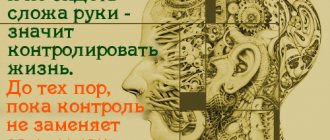The concept of “stress” has become very firmly established in everyday life in recent decades. The term itself refers to emotional dysfunction and tension, which is always accompanied by a negative mood. It came to us from medieval England, where “distress” meant grief or need.
Stress is the body’s ability to adapt to changing living conditions. In the modern rhythm of life, conditions change not only every day, but also every hour. Therefore, we can say with confidence that stressful situations have become commonplace.
By stress we mean a feeling of dissatisfaction, bitterness of loss or seasonal blues, but despite the general symptoms, this phenomenon has several types, subtypes, stages of development and phases. Let's take a closer look at them.
Stages of stress in psychology
Whatever the cause of stress, different organisms react to all kinds of influencing factors (stressors) in the same way. Doctors and psychologists, analyzing the condition of people, animals and even plants, came to the conclusion that there are two models of behavior of a living organism that is subject to a shocking effect:
- active, encouraging to fight for a return to normal life, adapting to new conditions;
- passive, allowing you to ignore the difficulty that has arisen, run away from searching for a solution, and come to terms with new circumstances.
Important! The path that a living organism takes depends not only on heredity and its own beliefs, but also on the amount of adaptive energy in the body.
Hans Selye, a Viennese-born medical scientist who carefully studies the pathologies of the human body, was one of the first to draw attention to the meaning of stress and its nature. It was he who revealed the concept of adaptive energy, which, in his opinion, is an irreplaceable resource of any organism, a source of strength that can make it possible to withstand stress. Selye believed that at the moment when adaptive energy runs out, old age and death occur. He also described three stages of stress, which have a certain order of occurrence:
- Anxiety;
- Resistance;
- Exhaustion.
Hans Selye
He experimentally proved that any animal exposed to prolonged stress necessarily goes through these three phases of stress.
Inevitably, alternating phases of stress have different durations. The same factor influencing different objects triggered the formation of stages of response reactions differing in duration. The physiology of the increase in physical stress is an individual characteristic that directly depends on the amount of accumulated adaptive energy. The psychological state of the individual also influences how long the anxiety will last and how soon the transition to the third stage may occur.
Stage one: alarm reaction and mobilization of forces
At the initial stage, under the influence of stress factors, the body reflexively reacts by releasing adrenaline into the circulatory system, which stimulates the production of cortisol, thereby mobilizing endurance and strength.
A high content of certain hormones in the blood activates natural instincts that work to rebuild all systems. Concentration instantly increases, the ability to deal with any load increases significantly, since we are talking about preserving vital systems.
Causes and therapy
Stages of conflict - a brief description of the main stages in psychology
The importance of stress in everyone’s life is difficult to overestimate – it inevitably leaves a scar on your mental or physical health. The cause, or stressor, can be either negative information or positive information, which carries a large emotional load on the object.
G. Selye gave in his book a vivid example of a situation in which positive information, becoming a stressor, can kill a person if he received it at a time when his irreplaceable supply of adaptive energy has dried up. As an object, he proposes to consider a woman who saw off her only son to war. Having received the tragic news that he died in battle, the mother spends a huge amount of energy, first on anxiety associated with the pain of loss, then on struggling with heartbreaking feelings. She lives for many more years, keeping the memory of her son alive. But, if after a certain number of years it turns out that the funeral came to her by mistake, her child is alive, and one day he opens the door and enters the house, the woman may lose consciousness from stress, already based on positive emotions. A strong shock, catching her at an advanced age, can provoke a heart attack and, as a result, death. An exhausted body will not find the strength to adapt, in which case the stage of exhaustion will begin.
The body itself at the cellular level is also capable of experiencing stress. On a daily basis, a person may encounter a stage of anxiety when, for example, he is forced to be outside in extremely low temperatures. The first stage of the muscle is met with tone and trembling, after which the body constricts, as a result of which the vessels of the extremities narrow, the skin significantly reduces heat loss, and the vital organs maintain the desired temperature and are provided with the necessary volume of oxygen due to active blood circulation. This, like the second phase of stress development, is a vivid example of resistance.
Exposure to low temperatures
Attention! If you know exactly at what stage stress begins, you can take timely measures to prevent its development in order to preserve adaptive energy.
Therapy that begins at the first stage of development will be the most effective, even if it is limited to the proper organization of leisure time, than heavy drug assistance, after the resistance phase mechanism has been launched.
Relaxation is the main direction that psychologists recommend starting with for those who are experiencing the first stage of stress. It is important to get rid of muscle tone if it occurs as a result of nervous strain. In this case, a professional massage therapist will help. In the complex, you should not neglect a change of scenery. However, G. Selye argued that in almost all cases occupational therapy can help cope with even the most severe stress. When a person manages to become useful and engage in creative activities, he switches from the confusion syndrome and concentrates on business, saving even his soul from a serious illness.
Light and dark side
We are accustomed to the fact that stress always has negative consequences, called distress, but there is also a positive side to this phenomenon - eustress:
- Distress is characterized by an imbalance in the physiological and psychological parameters of the body. It can be short-term and quickly reach the “boiling point”, or it can become chronic and entail failures of all vital systems.
- Eustress can be defined by a surge of joyful emotions and a person’s positive attitude. This happens when he knows about an approaching problem situation, does not know how to solve it, but hopes for a successful outcome. For example, an interview for a well-paid position or entrance exams to an educational institution. Such stress is necessary to solve everyday problems that arise, because it mobilizes all forces for a positive outcome. For example, despite the hated ringing of the alarm clock in the morning, it makes you cheer up and wake up. Eustress, although weak in strength, is beneficial to human health and positions itself as an “awakening reaction.”
Subtypes of distress
The most common subtype of distress is physiological stress. It occurs when external factors influence the human body. If you get burned or hungry, overheated in the sun and pinch your finger, then you cannot do without stressful shocks. At the physiological level, stress is divided into several groups:
- biological is associated with the occurrence of various diseases;
- chemical stress caused by exposure to chemicals, as well as oxygen starvation or excess oxygen);
- physical is provoked by excessive physical exertion, professional athletes are susceptible to it;
- mechanical occurs in the postoperative period, when complex injuries occur that violate the integrity of tissues or organs.
The next subtype is psychological stress, which is characterized by two types of conflict:
- Dissatisfaction with oneself associated with a discrepancy between expectations and reality . This conflict most often occurs among people who cannot come to terms with age-related changes in appearance and the body as a whole.
- Stressful state due to social conflicts within a social unit . For example, intra-family conflicts, quarrels with friends or colleagues.
Emotional stress occurs when a person is exposed to an emotional stimulus. Conflicts become such irritants when a person cannot satisfy biological or sociocultural needs for a long time.
For example, a strong resentment towards a loved one, deception, as well as information overload, which usually occurs when preparing for exams or submitting annual reports. Over the course of many years of research, it has become clear that stress is individual for each person and leads to different consequences.
Interestingly, people with increased stress tolerance quickly cope with extreme situations. Those whose indicator is underestimated may encounter neuroses, high blood pressure, and disruption of the vital systems of the body. What will suffer the most depends on individual characteristics and the presence of chronic diseases, because the load mainly falls on the weakest link.
Three stages of stress
Types of stress in psychology - their characteristics and solutions
Conducting laboratory studies on rats, the scientist was able to conclude that the stages of stress development are identical for absolutely all organisms and do not depend on the type of stressor. They can be cold, heat, an injected poison or hormone, trauma (the organisms reacted with the same changes in the internal organs). This phenomenon was called the “general adaptive syndrome”; it was it that was analyzed in theory, then studied in detail in practice before it could be characterized by three stages of stress in psychology.
Alarm stage
A short phase of anxiety is characteristic of people with high stress tolerance. An anxious state does not help solve the problem, does not allow you to concentrate on finding a way out of a difficult situation, and can provoke panic.
Anxiety - the first phase
Stage of resistance (resistance)
After probable confusion or anxiety of the organs (depending on the type of stress), a stage comes at which the body begins to resist. This is possible if the consequences of the stressor are compatible with adaptation.
Exhaustion stage
With prolonged resistance, the reserves of adaptive energy are significantly depleted; after its depletion, according to research, anxiety sets in again, but it already has the definition of an irreversible reaction and leads to death.
Additional Information. Bleeding, as an alarming reaction of the body to injury, is replaced by the formation of platelets, which are required to stop blood loss (resistance).
As a result of a long struggle, the body may lose a lot of blood, be unable to save itself, become exhausted and die.
Stage two: resistant, or resistance and adaptation
The second phase of the adaptation syndrome occurs when the body has already reached the limit of resistance. Further, the transformations that the stressful situation caused must stabilize and take hold. Under stress, all human systems work to the limit, and adaptation occurs at a rapid pace. There are two important factors influencing the speed of adaptation:
- The body's innate ability to adapt.
- The power of stress factors.
The adaptive capabilities of an individual have their limits; a long and severe stressful situation is exhausting and OSA enters the third phase.
Types and symptoms of stress
How to recover from stress and gain strength for women and men
Although it was recognized that there is no unambiguous static definition of the term “stress”, nevertheless, the condition itself is usually divided into two types:
- Eustress;
- distress.
Eustress is the result of emotional upsurge. It is often compared to a psychological awakening. This is a kind of source of adrenaline. Whereas distress is always a negative reaction that a person may experience upon learning about an unpredictable divorce or the death of a loved one.
Eustress – emotional awakening
Typical symptoms of stress are more related to distress:
- sleep disturbance;
- denial of the problem;
- increased nervousness;
- aggressive reaction to the friendly attitude of others;
- disruption of the cardiovascular system;
- ulcers of the gastrointestinal tract;
- surges in blood pressure.
Important! Selye's laboratory studies confirmed that disturbances in the digestive and cardiovascular systems can be considered reliable symptoms of stress.
When does stress develop?
The formation of stress is caused by physical or psychological reasons.
The first group includes:
- burn;
- bone fracture;
- severe pain;
Subscribe to our INSTAGRAM account!
- surgical intervention;
- significant hypothermia or overheating;
- sepsis;
- infectious diseases, especially difficult ones;
- overwork, heavy physical professional activity;
- severe environmental pollution.
Psychological factors are very diverse and are divided into two subgroups: internal and external.
The first include:
- strong and sharp fear;
- disappointment;
- presence of internal conflict;
- desire for perfectionism;
- pessimism;
- imbalance between a person’s own expectations and reality;
- high or low self-esteem;
- pressure from others;
- feeling of missing something important in life;
- impossibility of self-realization and self-expression.
External factors include:
- action that threatens life or health;
- attack by a person or animal;
- conflict situations at work or at home;
- financial difficulties;
- military situation in the country;
- natural or man-made disasters;
- divorce proceedings.
How to recover from stress
Having studied in detail all the stages of stress, Hans Selye believed that the best way to recover from emotional shock and general immersion in grief was to turn to memories of past victories and successes that happened throughout life. Bright pictures that carry a positive charge will help restore faith in the best and relieve the burden of experiences.
If stress has become a turning point in a person's life, he may require qualified medical assistance. When a patient who agrees to medical intervention has at least one meeting with a psychotherapist who manages to win over a person with a traumatized psyche, the emotional conversation alone will already produce results.
By exposure time
According to this classification, there are two types of stress: long-term or short-term.
People experience the acute, or short-term, form every day. Any events in the external world affect the mental state. Such stress goes through all stages of development in a short period of time. Its most severe manifestation is shock.
The big problem with this type of stress is that it creates memories.
Long-term stress can occur without an acute stage. If a person is constantly exposed to emotional stress and has even become accustomed to it, sooner or later this will lead to neurosis and a nervous breakdown. To some extent it depends on the level of psychological resistance.
Ways to respond to stress
A stressor causes a complex of emotional manifestations. Psychologists have identified the following types of response:
- "Ox Stress" This type of reaction involves being at the limit of psychological, mental or physical abilities. An individual can live in a familiar rhythm for a long time, being in a traumatic situation.
- "Lion Stress" A person violently shows emotions and reacts expressively to events.
- "Bunny Stress" Characterized by attempts to hide from problems, lack of activation. The person experiences the situation passively.
The reaction to a stress factor can be immediate or expressed in protracted experiences.
Interesting facts about stress
Human behavior under the influence of stressors is constantly being studied. Scientists from Sweden found that a person’s height decreases by 1% in the evening after experiencing stress. This phenomenon is associated with an uncontrolled tense state of muscle tissue in the back and shoulders.
Other interesting facts about stress:
- the neurochemical composition in the body changes;
- laughter reduces the level of stress hormones and prolongs life;
- after a stressful situation, hair may fall out after 3 months;
- an increasing concentration of the hormone cortisol stimulates the accumulation of fat in the waist area;
- blood viscosity increases;
- in a stressful situation, scabies may appear due to activation of the part of the brain responsible for the sensation of itching;
- Chronic stress in children slows down their growth;
- men more often than women suffer from the consequences of emotional shock;
- the likelihood of developing liver cancer and cirrhosis increases;
- It is believed that surgeons, rescuers, pilots, photojournalists, advertising agents and realtors are most susceptible to stress.
Stressors are not always a negative factor in life. In some cases, they increase a person’s intellectual and physical abilities and help them survive in difficult conditions. Sometimes they contribute to making important decisions and stimulate personal growth.
It is important that emotional upheavals are not protracted and are caused by positive events in life.
Stress scale. Table.
| Stressful Event | Stress level (in points) |
| Death of wife or husband | 100 |
| Divorce | 73 |
| Separation of marriage partners | 65 |
| Imprisonment | 63 |
| Death of a close relative | 63 |
| Own illness or accident (injury) | 53 |
| Marriage | 50 |
| Dismissal from work | 47 |
| Reconciliation with husband/wife | 45 |
| Retirement | 45 |
| Deterioration in the health of a family member | 44 |
| Pregnancy | 40 |
| Sexual difficulties | 39 |
| Adding a family | 39 |
| Changes at work | 39 |
| Change in financial position | 38 |
| Death of a close friend | 37 |
| Changing the scope of work activity | 36 |
| Increasing number of domestic disputes | 36 |
| Big debt | 31 |
| Foreclosure | 30 |
| Changing job responsibilities | 29 |
| The beginning of an independent life for a son or daughter | 29 |
| Conflict with in-laws | 29 |
| Outstanding Personal Achievement | 28 |
| Spouse starts or stops working | 26 |
| Start or end of studies | 26 |
| Changes in living conditions | 25 |
| Reconsidering personal habits | 24 |
| Trouble with management | 23 |
| Changes in operating conditions or hours | 20 |
| Changing of the living place | 20 |
| Change of educational institution | 20 |
| Changing your free time habits | 19 |
| Changes in activities of a religious nature | 19 |
| Changes in community work | 18 |
| Small debt | 17 |
| Changing your sleep habits | 16 |
| Changing the frequency of family gatherings | 15 |
| Change in Power Mode | 15 |
| Vacation | 13 |
| Christmas | 12 |
| Minor violations of the law | 11 |
| Total stress level during the year (points) | Risk of disease (%) |
| more than 300 | 80 |
| 150 — 300 | 50 |
| less than 150 | 35 |
Write in the comments how many points you scored on the stress scale over the previous year.
Name the 3 most significant events of the past year. How did they influence your psyche?
Read the best materials from a happiness psychologist on this topic!
- Attention deficit disorder. ADHD test. Computer addiction. Do you suffer from ADHD - attention deficit hyperactivity disorder? Most likely no. But ADHD syndrome is a conditioned deficiency syndrome [...]
- New Year 2020 what will be interesting on the blog of a happiness psychologist New Year 2020 on the blog of a happiness psychologist. New Year 2020 will fill blogs on the Internet with new and interesting materials. On the blog of a happiness psychologist [...]
- OCD Test: Obsessive-Compulsive Disorder Test The OCD test can help separate obsessive-compulsive disorder from other phobic disorders. What are the basic concepts of OCD and […]
- Psychology of poverty: 6 ways to make yourself poor Is poverty a vice? What are the psychological causes of poverty? The thinking of a poor man and 6 ways to make yourself, become poor from Tatyana Oshmyanskaya. […]
- Egogram. Harmonious structure of Personality. In the previous post “Personality Structure. Adult." we put together a mosaic of individual parts of the personality into a complete picture. Although several readers […]
- Online survey. Self-hypnosis. Fulfillment of desires with the power of thought. Online survey of a happiness psychologist. Is self-hypnosis healing, scientific technology, or the fulfillment of desires by the power of thought? Take part in online […]
- 3 groups of life scenarios - what is your scenario? “In general, most of us chose scenarios that were a mixture of win, lose and win-win […]
What determines susceptibility to stress?
The attitude towards an event or news will differ from person to person. Therefore, for one person the situation will cause emotional shock, and for another only annoyance. Those. receptivity depends on the meaning a person attaches to what is happening. Temperament, the health of the nervous system, upbringing, life experience, and moral assessments are of great importance.
Recent research by scientists has shown that it is more difficult to anger people with low levels of cortisol (the stress hormone). They do not lose their composure in stressful situations.
Diagnostics
Even with clear symptoms of stress, a person may deny its presence. Diagnosis of the condition is carried out by a psychiatrist, psychotherapist or psychologist. A detailed conversation is held with the patient, complaints are clarified. For accurate diagnosis, questionnaires are used:
- To determine your own assessment of stress resistance, a specially designed test is carried out. Express diagnostics of emotional and psychological stress is used. The patient is tested on the Lemoore-Tessier-Fillion Psychological Stress Scale, the Spielberger-Hanin State Anxiety Scale, and the Zung Self-Rating Anxiety Scale. The nature of the adaptation syndrome is determined.
- The Clinical Complaints Scale is used to assess the consequences of stress and negative changes in the body. Questionnaires are used to determine suicidal tendencies and depression. Tests in this group are designed to detect predisposition to neurotic disorders and determine stress resistance.
Bookstores offer a large number of publications containing various tests for self-analysis.
However, psychologists recommend seeking professional help if you suspect a stressful condition, since self-diagnosis is not objective.










